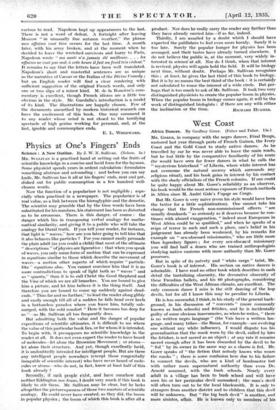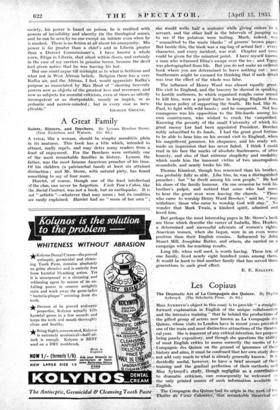West Coast
Africa Dances. By Geoffrey Corer. (Faber and Faber. 15s.)
MR. GonEa, in company with the negro dancer, Feral Benga, motored last year through parts of French Guinea, the Ivory
Coast and the Gold Coast to study native dances. As he travelled by car he was never able to leave the main roads, but he lost little by the comparative familiarity of his route (he would have seen far fewer dances in what he calls the " mysterious hinterland " of Liberia, where white interest has not overcome the natural secrecy which surrounds any
religious ritual), and his book gains in interest by his contact with the shady officialism of the French colonies. If one could be quite happy about Mr. Corer's reliability as an observer, his book would be the most serious exposure of French methods in Africa since M. Andre Gide's Voyage an Congo.
But Mr. Gorer is very naive (even his style would have been the better for a little sophistication). One cannot take his charge that the French non-commissioned officers " are usually drunkards " as seriously as it deserves because he con- tinues with absurd exaggeration, " indeed most Europeans in West Africa could be so qualified," and when he speaks of a reign of terror in such and such a place, one's belief in his judgement has already been weakened, by his remarks for example on " sex-obsessed missionaries," who are little more than legendary figures ; for every sex-obsess...A missionary you will find half a dozen who are trained anthropologists studying native customs with more authority than Mr. Corer possesses.
But in spite of its naivety and " white cargo " taint, Mr. Corer's book is of interest. His section on native dances is admirable. I have read no other book which describes in such detail the tantalizing obscurity, the decorative obscenity of these Freudian ballets, and his 60 photographs, considering the difficulties of the West African climate, are excellent. The only common dance I miss is the stilt dancing of the hop devils, but for all I know this may be peculiar to Liberia.
He is less successful, I think, in his study of the general back- ground, in his discussion of " convents " (more commonly known as bush schools) and fetishes, and he is incidentally guilty of some obvious inaccuracies, as when he writes, " there is no written negro language " (the Vais have a written lan- guage, and many tribes—the Bassa, for example—are evolving one without any white influence). I would dispute too his generalization that the mask worn by the devil, called by him the fetisher, is not sacred as an object ; at any rate it remains sacred enough after it has been discarded by the devil to be " fed by its owner in the same way as a charm is fed. Mr. Corer speaks of " the fiction that nobody knows who wears the masks " ; there is some confusion here due to his failure to connect the devils, who are a kind of headmaster but with rather more supernatural authority than even Dr. Arnold assumed, with the bush schools. Nearly every adult in a village has been to bush• school and will have seen his or her particular devil unmasked•; the man's devil will often turn out to be the local blacksmith. It is only to strangers from another district and to children that this devil will be unknown. But " the big bush devil" is another, and more sinister, affair. He is known only to members of his society, his power is based on poison, he is credited with powers of invisibility and alacrity (in the theological sense), and he can be seen by no one except in initiate even when he is masked. There is no fiction at all about his anonymity. His power is far treater than a chief's and in Liberia greater than a District Commissioner's. I have known a whole town, Zitiga in Liberia, shut silent within doors, and certainly in the case of my carriers in genuine terror, because the devil had given notice that he was leaVing his hut. But one could argue till midnight as to what is fictitious and what not in West African beliefs. Religion there has a very Kafka air, and the African, .I feel, would appreciate Kafka's purpose as enunciated by Max Brod of " showing heavenly powers now as objects of the greatest love and reverence, and now as subjects for. scornful Criticism, even at times as utterly incompetent or as disrputhble, moody_ or impish, or as pedantic and narrow-Minded ; kit in every case as inex-



















































 Previous page
Previous page